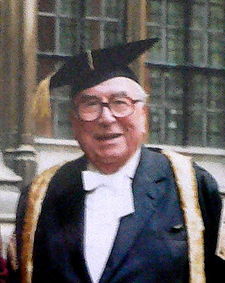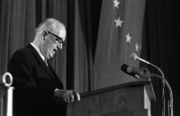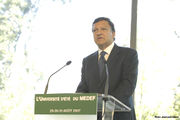Roy Jenkins
| The Right Honourable The Lord Jenkins of Hillhead OM PC |
|
 |
|
|
Chancellor of the University of Oxford
|
|
| In office 14 March 1987 – 5 January 2003 |
|
| Preceded by | The Earl of Stockton |
|---|---|
| Succeeded by | The Lord Patten of Barnes |
|
Leader of the Social Democratic Party
|
|
| In office 7 July 1982 – 13 June 1983 |
|
| Deputy | David Owen |
| Preceded by | The Gang of Four |
| Succeeded by | David Owen |
|
|
|
| In office 18 August 1977 – 12 January 1981 |
|
| Preceded by | François-Xavier Ortoli |
| Succeeded by | Gaston Thorn |
|
Home Secretary
|
|
| In office 5 March 1974 – 10 September 1976 |
|
| Prime Minister | Harold Wilson James Callaghan |
| Preceded by | Leonard Robert Carr |
| Succeeded by | Merlyn Rees |
| In office 23 December 1965 – 30 September 1967 |
|
| Prime Minister | Harold Wilson |
| Preceded by | Frank Soskice |
| Succeeded by | James Callaghan |
|
Shadow Home Secretary
|
|
| In office 4 May 1973 – 4 March 1974 |
|
| Leader | Harold Wilson |
| Preceded by | Shirley Williams |
| Succeeded by | James Prior |
|
Deputy Leader of the Labour Party
|
|
| In office 19 June 1970 – 19 April 1972 |
|
| Leader | Harold Wilson |
| Preceded by | George Brown |
| Succeeded by | Edward Short |
|
Shadow Chancellor of the Exchequer
|
|
| In office 19 June 1970 – 19 April 1972 |
|
| Leader | Harold Wilson |
| Preceded by | Iain Macleod |
| Succeeded by | Denis Healey |
|
|
|
| In office 30 November 1967 – 19 June 1970 |
|
| Prime Minister | Harold Wilson |
| Preceded by | James Callaghan |
| Succeeded by | Iain Macleod |
|
Member of Parliament
for Glasgow Hillhead |
|
| In office 25 March 1982 – 11 June 1987 |
|
| Preceded by | Tam Galbraith |
| Succeeded by | George Galloway |
|
Member of Parliament
for Birmingham Stechford |
|
| In office 23 February 1950 – 31 March 1977 |
|
| Preceded by | Constituency established |
| Succeeded by | Andrew MacKay |
|
Member of Parliament
for Southwark Central |
|
| In office 29 April 1948 – 23 February 1950 |
|
| Preceded by | John Hanbury Martin |
| Succeeded by | Constituency abolished |
|
|
|
| Born | 11 November 1920 Abersychan, United Kingdom |
| Died | 5 January 2003 (aged 82) Oxfordshire, United Kingdom |
| Political party | Liberal Democrats (1988–2003) |
| Other political affiliations |
Labour (Before 1981) Social Democratic (1981–1988) |
| Alma mater | Cardiff University Balliol College, Oxford |
Roy Harris Jenkins, Baron Jenkins of Hillhead OM, PC (11 November 1920 – 5 January 2003) was one of the most prominent British politicians of the late 20th Century, at the forefront of politics for over 50 years.
The son of a coal miner who later became a union official and Labour MP, Roy Jenkins served with distinction in World War II. Elected to Parliament as a Labour member in 1948, he served in several major posts in Harold Wilson's First Government. As Home Secretary from 1965-1967, he sought to build what he described as "a civilised society", with measures such as the effective abolition in Britain of capital punishment and theatre censorship, the decriminalisation of homosexuality, relaxing of divorce law, suspension of birching and the legalisation of abortion. He is strongly criticised for some of these measures by conservatives such as Peter Hitchens. As Chancellor of the Exchequer from 1967-1970, he pursued a tight fiscal policy later praised by Margaret Thatcher[1] In 1970, he was elected Deputy Leader of the Labour Party, but resigned in 1972 because he supported entry to the Common Market while the party opposed it. When Wilson re-entered government in 1974 Jenkins returned to the Home Office, but was dismissed by James Callaghan in 1976.
Disillusioned by British politics, Jenkins was appointed President of the European Commission in 1977, serving until 1981: he was the first and to date only British holder of this office. In 1981, dismayed with the Labour Party's leftward drift, he was one of the Gang of Four Labour moderates who formed the Social Democratic Party (SDP). In 1982 he won a famous by-election in a Conservative seat and returned to parliament; but after the SDP was badly beaten in the 1983 election he resigned as SDP leader.
In 1987, Jenkins was elected to succeed Harold Macmillan as Chancellor of the University of Oxford following the latter's death; he held this position until his death. A few months later, he was defeated in Hillhead by left-winger George Galloway. He accepted a life peerage. In the late 1990s, he was an adviser to Tony Blair and chaired the Jenkins Commission on electoral reform. Roy Jenkins died in 2003, aged 82.
In addition to his political career, he was also a noted historian and writer.
Contents |
Early life
Born in Abersychan, Monmouthshire in south-eastern Wales, as an only child, Roy Jenkins was the son of a National Union of Mineworkers official, Arthur Jenkins. His father was wrongly imprisoned during the 1926 General Strike for his supposed involvement in a riot and later became Member of Parliament for Pontypool, Parliamentary Private Secretary to Clement Attlee, and briefly a minister in the 1945 Labour government. Jenkins's mother, Hattie Harris, was the daughter of a steelworks manager.
Jenkins was educated at Abersychan County School, University College, Cardiff, and at Balliol College, Oxford, where he was twice defeated for the Presidency of the Oxford Union but took First Class Honours in Politics, Philosophy and Economics (PPE). His university colleagues included Tony Crosland, Denis Healey, and Edward Heath, and he became friends with all three, although he was never particularly close to Healey. During the Second World War he served with the Royal Artillery and then at Bletchley Park, reaching the rank of captain. On 20 January 1945, in the final year of the War, he married Jennifer Morris, who later became Dame Jennifer Jenkins Jennifer was made a DBE for services to ancient and historical buildings.
Member of Parliament
Having failed to win Solihull in 1945, he was elected to the House of Commons in a 1948 by-election as the Member of Parliament for Southwark Central, becoming the "Baby of the House". His constituency was abolished in boundary changes for the 1950 general election, when he stood instead in the new Birmingham Stechford constituency. He won the seat and represented the constituency until 1977.
Jenkins was principal sponsor, in 1959, of the bill which became the liberalising Obscene Publications Act, responsible for establishing the "liable to deprave and corrupt" criterion as a basis for a prosecution of suspect material and for specifying literary merit as a possible defence. Like Healey and Crosland, he had been a close friend of Hugh Gaitskell and for them Gaitskell's death and the elevation of Harold Wilson as Labour Party leader was a setback.
In government
After the 1964 general election Jenkins was appointed Minister of Aviation. While at Aviation he oversaw the high profile cancellations of the BAC TSR-2 and Concord projects (although the latter was later reversed after strong opposition from the French Government). In January 1965 Patrick Gordon Walker resigned as Foreign Secretary and in the ensuing reshuffle Wilson offered Jenkins the Department of Education, however he declined it, preferring to stay at Aviation.[2]
In the summer of 1965 Jenkins eagerly accepted an offer to replace Frank Soskice as Home Secretary. However Wilson, dismayed by a sudden bout of press speculation about the potential move, delayed Jenkins' appointment until December. Once Jenkins took office he immediately set about reforming the operation and organisation of the Home Office. The Principal Private Secretary, Head of the Press and Publicity Department and Permanent Under-Secretary were all replaced. He also redesigned his office, famously replacing the board on which condemned prisoners were listed with a drinks cabinet. After the 1966 general election, in which Labour won a comfortable majority, Jenkins pushed through a series of police reforms which reduced the number of separate forces from 117 to 49.
Immigration was a divisive and provocative issue during the late 1960s and on 23 May 1966 Jenkins delivered a speech on race relations, which is widely considered to be one of his best.[3] Addressing a London meeting of the Nation Committee for Commonwealth Immigrants he notably defined Integration:
... not as a flattening process of assimilation but as equal opportunity, accompanied by cultural diversity, in an atmosphere of mutual tolerance.
Before going onto ask:
Where in the world is there a university which could preserve its fame, or a cultural centre which could keep its eminence, or a metropolis which could hold its drawing power, if it were to turn inwards and serve only its own hinterland and its own racial group?
And concluding that:
To live apart, for a person, a city, a country, is to lead a life of declining intellectual stimulation.[4]
Jenkins is often seen as responsible for the most wide-ranging reforms that the 1960s Labour governments would enact. He refused to authorise the birching of prisoners and was responsible for the relaxation of the laws relating to divorce, abolition of theatre censorship and gave government support to David Steel's Private Member's Bill for the legalisation of abortion and Leo Abse's bill for the decriminalisation of homosexuality. Wilson, with his puritan background, was not especially sympathetic to these developments, however. Jenkins replied to public criticism by asserting that the so called permissive society was in reality the civilised society.
Chancellor of the Exchequer
From 1967 to 1970 he was Chancellor of the Exchequer, replacing James Callaghan following the devaluation of the pound in November 1967. He quickly gained a reputation as a particularly tough Chancellor, although he was hesitant about increasing taxes and reducing expenditure. He is particularly credited with improving Britain's Current Account position towards the end of the decade. It is though, generally assumed that Labour's defeat in the 1970 general election was partly the consequence of one month's bad trade figures announced a few days before the election and his delivery of a fiscally neutral Budget shortly before the election.
Deputy Leader of the Labour Party
After Labour unexpectedly lost power in 1970 Jenkins was appointed Shadow Chancellor of the Exchequer by Harold Wilson. Jenkins was also subsequently elected to the deputy leadership of the Labour Party in July 1970, defeating future Labour Leader Michael Foot and former Leader of the Commons Fred Peart at the first ballot. He resigned both the deputy leadership and his shadow cabinet position in April 1972 however, over the party's policy on favouring a referendum on British membership of the European Economic Community (EEC). His position had been undermined the previous year by his decision to lead sixty-nine Labour MPs through the division lobby in support of the Heath's government's motion to take Britain into the EEC. This led to some former admirers, including Roy Hattersley, choosing to distance themselves from Jenkins. His lavish lifestyle — Wilson once described him as "more a socialite than a socialist" — had already alienated much of the Labour Party from him. Jenkins returned to the shadow cabinet in May 1973 as Shadow Home Secretary.
In government
When Labour returned to power he was made Home Secretary again, serving from 1974 to 1976. In this period he undermined his previous liberal credentials to some extent by pushing through the controversial Prevention of Terrorism Act, which, among other things, extended the length of time suspects could be held in custody and instituted exclusion orders.
His nickname in Private Eye magazine was 'Smoothiechops'.[5]
President of the European Commission
.jpg)
Jenkins was a candidate for the leadership of the Labour Party in March 1976, but came third out of the six candidates, behind Callaghan and Michael Foot. Jenkins had wanted to become Foreign Secretary, (Rosen (2001) 318), but accepted an appointment as President of the European Commission (succeeding François-Xavier Ortoli) after Callaghan appointed Anthony Crosland to the Foreign Office . Unofficially he was known as King John XV, from the French pronunciation of his name, Roi Jean Quinze. The main development overseen by the Jenkins Commission was the development of the Economic and Monetary Union of the European Union from 1977, which began in 1979 as the European Monetary System, a forerunner of the Single Currency or Euro.[6] President Jenkins was the first President to attend a G8 summit on behalf of the Community.[7] Jenkins remained in Brussels until 1981, contemplating the political changes in the UK from there.
The Social Democratic Party
On 22 November 1979 Jenkins delivered the annual Dimbleby Lecture which he called "Home Thoughts from Abroad", detailing what he saw as the reasons for Britain's persistent underperformance as a failure of adaptability and problems associated with the two party system. More importantly he advocated a new "radical centre" and called for a new political grouping. As one of the so-called "Gang of Four", he was a founder of the Social Democratic Party (SDP) in January 1981 with David Owen, Bill Rodgers and Shirley Williams.
He attempted to re-enter Parliament at the Warrington by-election in 1981 but Labour retained the seat with a small majority. He was more successful in 1982, being elected in the Glasgow Hillhead by-election as the MP for a previously Conservative-held seat.
During the 1983 election campaign his position as the prime minister designate for the SDP-Liberal Alliance was questioned by his close colleagues, as his campaign style was now regarded as ineffective; the Liberal leader David Steel was considered to have a greater rapport with the electorate.
He led the new party from March 1982 until after the 1983 general election, when Owen succeeded him unopposed. Jenkins was disappointed with Owen's move to the right, and his acceptance and backing of some of Thatcher's policies. At heart, Jenkins remained a Keynesian.
He continued to serve as SDP Member of Parliament for Glasgow Hillhead until his defeat at the 1987 general election by the Labour candidate George Galloway.
Peerage and death
From 1987, Jenkins remained in politics as a member of the House of Lords as a life peer with the title Baron Jenkins of Hillhead, of Pontypool in the County of Gwent. Also in 1987, Jenkins was elected Chancellor of the University of Oxford. In 1993, he was appointed to the Order of Merit. He was leader of the Liberal Democrats in the Lords until 1997. In December 1997, he was appointed chair of a Government-appointed Independent Commission on the Voting System, which became known as the "Jenkins Commission", to consider alternative voting systems for the UK. The Jenkins Commission reported in favour of a new uniquely British mixed-member proportional system called "Alternative vote top-up" or "limited AMS" in October 1998. No action had been taken on this recommendation at the time of Jenkins' death from a heart attack at 9 a.m. on 5 January 2003. He earlier underwent heart surgery in November 2000, and postponed his 80th birthday celebrations, by having a celebratory party on 7 March 2001.
Jenkins wrote 19 books, including a biography of Gladstone (1995), which won the 1995 Whitbread Award for Biography, and a much-acclaimed biography of Winston Churchill (2001). His official biographer, Andrew Adonis, Baron Adonis, was to have finished the Churchill biography had Jenkins not survived the heart surgery he underwent towards the end of its writing.
He died on 5 January 2003, aged 82, after suffering a heart attack at his home in Oxfordshire.[8]
At the time of his death he was apparently starting work on a biography of U.S. President Franklin D. Roosevelt.
Roy Jenkins is fondly remembered by Private Eye as having a passion for claret and a distinct inability to pronounce his 'r's. This was clearly shown in their obituary cartoon with the caption: Roy Jenkins, 1920-2003. WIP. Referring to the same, one of the entries in Douglas Adams' The Meaning of Liff reads "WATH (n.) : The rage of Roy Jenkins".
For some conservatives, such as Peter Hitchens in The Abolition of Britain, he was a "cultural revolutionary" and takes a large part of the responsibility for the decline of "traditional values" in Britain.
References
- ↑ The Path To Power (London, 1995)- Thatcher says that the economy of the early 70s was recovering from the late 60s recession thanks to Jenkins' policies and that the Barber Boom reversed these.
- ↑ Roy Jenkins. A Life at the Centre. Politico's. ISBN 9781842751770.
- ↑ The Penguin Book of Twentieth-Century Speeches. ISBN 9780140285000.
- ↑ The Penguin Book of Twentieth-Century Speeches. ISBN 9780140285000.
- ↑ "Lord Jenkins of Hillhead, OM". Daily Telegraph. 6 January 2003.
- ↑ http://www.euro-know.org/dictionary/j.html
- ↑ "EU and the G8". European Commission. http://www.deljpn.ec.europa.eu/union/showpage_en_union.external.g8.php. Retrieved 2007-09-25.
- ↑ "Roy Jenkins dies". BBC News Online. BBC. 5 January 2003. http://news.bbc.co.uk/1/hi/uk_politics/2629269.stm. Retrieved 14 May 2010.
- Rosen, Greg (2001) Dictionary of Labour Biography, Politicos
Selected bibliography
Books by Roy Jenkins:
- Roosevelt. Pan Macmillan. 2005. ISBN 0330432060.
- Churchill. Macmillan. 2001. ISBN 0-333-78290-9.
- The Chancellors. Macmillan. 1998. ISBN 0-333-73057-7.
- Gladstone. Macmillan. 1995. ISBN 0-8129-6641-4.
- A life at the centre. Macmillan. 1991. ISBN 0-333-55164-8.
- Gallery of 20th century Portraits and Oxford Papers. David and Charles. 1989. ISBN 0-7153-9299-9.
- Truman. HarperCollins. 1986. ISBN 0-06-015580-9.
- Baldwin. Collins. 1984. ISBN 0-00-217586-X.
- Asquith. Collins. 1964. ISBN 0-00-211021-0., revised edition 1978
- Sir Charles Dilke: A Victorian Tragedy. Collins. 1958. ISBN 0-333-62020-8.
- Mr. Balfour's poodle; peers v. people. Collins. 1954. OCLC 436484.
Books about Roy Jenkins:
- Andrew Adonis & Keith Thomas — Editors (2004). Roy Jenkins: A Retrospective. Oxford University Press. ISBN 0-19-927487-8.
- Giles Radice (2002). Friends and Rivals: Crosland, Jenkins and Healey. Little, Brown. ISBN 0-316-85547-2.
- John Campbell (1983). Roy Jenkins, a biography. Weidenfeld & Nicolson. ISBN 0-297-78271-1.
External links
- Hansard 1803–2005: contributions in Parliament by Roy Jenkins
Offices held
| Parliament of the United Kingdom | ||
|---|---|---|
| Preceded by Edward Carson |
Baby of the House 1948–1950 |
Succeeded by Peter Baker |
| Preceded by John Hanbury Martin |
Member of Parliament for Southwark Central 1948–1950 |
Constituency abolished |
| New constituency | Member of Parliament for Birmingham Stechford 1950–1977 |
Succeeded by Andrew MacKay |
| Preceded by Tam Galbraith |
Member of Parliament for Glasgow Hillhead 1982–1987 |
Succeeded by George Galloway |
| Political offices | ||
| Preceded by Frank Soskice |
Home Secretary 1965–1967 |
Succeeded by James Callaghan |
| Preceded by James Callaghan |
Chancellor of the Exchequer 1967–1970 |
Succeeded by Iain Macleod |
| Preceded by Iain Macleod |
Shadow Chancellor of the Exchequer 1970–1972 |
Succeeded by Denis Healey |
| Preceded by Shirley Williams |
Shadow Home Secretary 1973–1974 |
Succeeded by James Prior |
| Preceded by Leonard Robert Carr |
Home Secretary 1974–1976 |
Succeeded by Merlyn Rees |
| Preceded by George Thomson |
British European Commissioner 1977–1981 Served alongside: Christopher Tugendhat |
Succeeded by Ivor Richard |
| Preceded by Christopher Soames |
Succeeded by Christopher Tugendhat |
|
| Preceded by François-Xavier Ortoli |
President of the European Commission 1977–1981 |
Succeeded by Gaston Thorn |
| Party political offices | ||
| Preceded by George Brown |
Deputy Leader of the Labour Party 1970–1972 |
Succeeded by Edward Short |
| Preceded by The Gang of Four |
Leader of the Social Democratic Party 1982–1983 |
Succeeded by David Owen |
| Preceded by The Baroness Seear as Leader of the Liberal Party in the House of Lords |
Leader of the Liberal Democrats in the House of Lords 1988–1997 |
Succeeded by The Lord Rodgers of Quarry Bank |
| Preceded by The Lord Diamond as Leader of the Social Democratic Party in the House of Lords |
||
| Academic offices | ||
| Preceded by The Earl of Stockton |
Chancellor of the University of Oxford 1987–2003 |
Succeeded by The Lord Patten of Barnes |
|
|||||||||||||
|
||||||||||
|
|||||||
|
|||||||
|
||||||||||||||
|
|||||||
|
||||||||||||||||||||||||||||||||||||
|
|||||
|
|||||
|
|||||
|
||||||||||||||||||||||||||
.svg.png)


